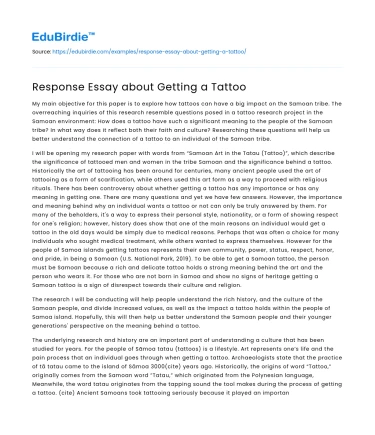Introduction
Tattoos, once primarily associated with subcultures and marginalized communities, have gained widespread acceptance as a form of personal expression and cultural identity. This growing trend is evidenced by the increasing number of individuals across various demographics who choose to adorn their bodies with ink. According to a 2019 survey by the Pew Research Center, nearly 30% of Americans have at least one tattoo, demonstrating a significant shift in societal perceptions. This essay seeks to explore the multifaceted nature of tattooing, examining its cultural significance, the psychological motivations behind getting inked, and the evolving social attitudes towards this ancient art form. By addressing counter-arguments and presenting real-life examples, this paper will provide a comprehensive analysis of why tattoos have become an integral part of modern identity. Understanding the cultural and sociological dimensions of tattooing not only highlights the diverse reasons behind this practice but also underscores its role as a medium for self-expression in contemporary society.
Cultural Significance of Tattoos
Tattoos have been an integral part of human culture for centuries, serving as symbols of social status, spiritual beliefs, and rites of passage. In Polynesian cultures, for example, tattoos are not merely decorative but are laden with meaning, representing one's genealogy and societal roles. These intricate designs are considered sacred, with the tattooing process itself being a ritualistic experience. Similarly, in Japan, irezumi—traditional Japanese tattoos—are deeply rooted in the country's history and folklore, often depicting mythological creatures and historical events. These cultural contexts illustrate how tattoos transcend mere aesthetics, embodying rich narratives and communal values. Anthropologist Lars Krutak underscores this point, noting that "tattoos are living symbols that resonate with the people and communities who wear them" (Krutak, 2015). Therefore, understanding the cultural significance of tattoos necessitates an appreciation of the historical and social frameworks within which they are embedded. While Western societies have largely embraced tattoos as a form of personal expression, the cultural weight they carry in other regions highlights their potential to convey complex social messages. This cultural dimension challenges the notion that tattoos are purely individualistic, suggesting instead that they can also act as conduits for cultural continuity and identity preservation.
Save your time!
We can take care of your essay
- Proper editing and formatting
- Free revision, title page, and bibliography
- Flexible prices and money-back guarantee
As tattoos become more mainstream, their cultural interpretations continue to evolve. Western societies, once stigmatizing tattoos as markers of deviance, now celebrate them as art and expressions of individuality. This shift is evident in the increasing popularity of tattoo conventions and exhibitions, which showcase the artistry and skill involved in modern tattooing. The cultural recontextualization of tattoos is further supported by academic research, which highlights the role of tattoos in fostering a sense of community among enthusiasts and artists alike. In this light, tattoos serve as a bridge between cultures, enabling cross-cultural exchanges and fostering mutual appreciation. As we delve deeper into the psychological motivations for getting tattoos, it is crucial to acknowledge the cultural narratives that inform these decisions, underscoring the complex interplay between individual desires and societal influences.
Psychological Motivations and Social Perceptions
The decision to get a tattoo is often driven by psychological motivations that reflect the individual's identity, experiences, and aspirations. For many, tattoos serve as a form of self-expression, a permanent testament to significant life events or personal beliefs. A study conducted by Armstrong et al. (2014) found that individuals often view their tattoos as part of their self-identity, with many citing personal growth, remembrance, and empowerment as key reasons for getting inked. This psychological dimension highlights the symbolic value of tattoos, which often function as visual narratives that encapsulate an individual's journey. Moreover, tattoos can provide a sense of control over one's body, particularly for those who have experienced trauma or significant life changes, enabling them to reclaim their narratives through body art.
While tattoos are increasingly embraced as forms of self-affirmation, societal perceptions can vary significantly, influenced by cultural, generational, and professional contexts. Despite the growing acceptance of tattoos in many parts of the world, certain sectors continue to view them with skepticism. In professional environments, for instance, visible tattoos may still be regarded as unprofessional or inappropriate, reflecting lingering biases about body art. This dichotomy underscores the complex social dynamics surrounding tattoos, which can simultaneously serve as instruments of empowerment and sources of discrimination. Addressing these counter-arguments requires a nuanced understanding of the evolving social landscape, where traditional norms are increasingly challenged by progressive attitudes towards personal freedom and expression. As tattoos continue to gain prominence, it is essential to foster dialogue about their social implications, advocating for greater acceptance and inclusivity in both personal and professional spheres.
Conclusion
In conclusion, tattoos have emerged as powerful symbols of cultural identity, personal expression, and social change. Their rich historical significance and diverse psychological motivations underscore their multifaceted nature, challenging simplistic interpretations of body art. As tattoos become more integrated into mainstream culture, they continue to redefine social norms and perceptions, fostering acceptance and appreciation across different contexts. However, the journey towards complete acceptance is ongoing, necessitating continued dialogue and education to dismantle lingering stereotypes and biases. By understanding the cultural, psychological, and social dimensions of tattooing, we can better appreciate the profound impact of this ancient art form on contemporary identity and society. As tattoos evolve alongside societal attitudes, they hold the potential to bridge cultural divides and promote a more inclusive understanding of self-expression and individuality.






 Stuck on your essay?
Stuck on your essay?

